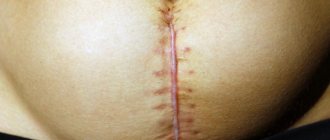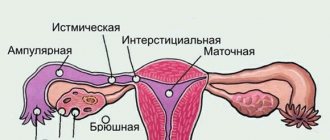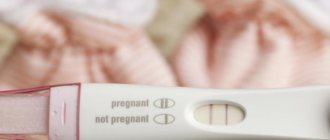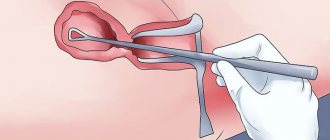Many people associate the word “menopause” with old age. In fact, it's just a new stage in life.
Menopause or menopause is characterized by a gradual decline in reproductive function in women, and also causes hormonal changes in the body, causing associated unpleasant symptoms.
This period makes its own adjustments to all spheres of a woman’s life, including the sexual one - during menopause, the work of the ovaries does not stop immediately and there is still the possibility of becoming pregnant, but due to hormonal imbalance, previous means of contraception are no longer suitable .
In this regard, the urgent question arises about choosing a new method and how to protect yourself.
What is menopause
Menopause is a period of decline of reproductive function. The ovaries stop producing estrogens, and over time the woman completely loses the ability to conceive. The menstrual cycle changes due to hormonal changes.
The duration of menopause is on average 10-12 years and goes through three stages:
- premenopause _ The beginning of hormonal changes. During this period, menstruation still occurs, but the cycle becomes irregular, menstruation is delayed, bleeding is more heavy or, conversely, scanty. Eggs continue to be produced, so there is a possibility of pregnancy. The first symptoms appear: hot flashes, mood swings. The duration of the period is about 5 years.
- menopause. It begins with the complete cessation of menstruation and lasts approximately 12 months. Characterized by complete loss of ovarian function and increased symptoms.
- postmenopause . It occurs after a complete absence of menstruation for a year and lasts until the end of life. During this period, hormonal levels stabilize and unpleasant symptoms disappear. A woman permanently loses the ability to conceive.
Stages of menopause
First, the ovaries reduce progesterone synthesis. This is the most important sex hormone that directly affects the cycle, pregnancy and embryo development. Next, the ovaries reduce estrogen production. These are female sex hormones. They influence the formation of the female body and reproductive function.
Due to hormonal deficiency, the gonads enter the active phase, causing malfunctions that negatively affect the woman’s condition. At this stage, reproductive function is still present and pregnancy is possible.
It is the next stage that affects the number of eggs. The number of ovarian follicles decreases, which is why ovulation becomes irregular, but does not disappear completely. The more time passes, the less often menstruation occurs. Just after a year has passed since your last period, you can understand that it is no longer possible to get pregnant.
Throughout this period, there is a chance of getting pregnant, since the eggs are still maturing.
What are the dangers of pregnancy during menopause?
Does a woman need to use protection during menopause? Yes, because the onset of menopause does not mean the inability to get pregnant . Menstruation does not stop immediately, but becomes irregular, for example, occurring once every three to four months. This means that eggs are still being released and there is a risk of fertilization.
Even if there is no menstruation for a year, the possibility of conception remains, since there are still some eggs left in the ovaries that can be fertilized during unprotected sex.
NOTE!
Pregnancy is possible for another 2 years after the cessation of menstruation.
If a woman wants to give birth to a child during this period, then she should prepare for difficulties.
After 45 years, hormonal changes affect the functioning of all organs and can cause complications:
- diseases of the cardiovascular system;
- failure of the kidneys;
- prolapse of the pelvic organs.
In addition, the risk of having children with disabilities at this age increases sharply . Doctors also do not advise having an abortion, since a woman’s body is very vulnerable and the likelihood of complications is much greater than at a young age.
By the way, childbirth will not be able to prevent the onset of menopause, but will only delay it slightly.
Methods of contraception during menopause
The modern pharmaceutical industry offers many options for contraceptives suitable for use during menostasis.
Only an experienced doctor who has sufficient information about the patient’s health status and the characteristics of her menopausal changes can determine how to properly protect themselves during menopause.
Let us consider in more detail the means by which protection is possible during this period of time.
Hormonal contraceptives
This group of drugs includes not only taking drugs in the form of tablets and pills, but also the use of various patches and hormonal injections.
The use of such drugs has significant pros and cons. For example, with the correct selection of hormonal contraceptives, it is possible to significantly reduce the adverse symptoms of menopausal syndrome due to the supply of hormones from the outside. In addition, when taken in a timely manner, hormonal medications can reliably protect against the onset of unplanned pregnancy.
However, taking hormonal drugs can cause problems with the cardiovascular system, disruption of blood clotting, the development of varicose veins, and an imbalance of lipid and carbohydrate metabolism. Menopause is not the time for experimentation, so any prescriptions must be carried out by a specialist.
Barrier methods of protection
This includes condoms (male and female), uterine caps and diaphragms. Their essence is defined by the word “barrier”, that is, these methods create an obstacle to the reunification of the egg and sperm. Male condoms have gained the most popularity as the most easily applicable and reliable method of protection, not only from unwanted pregnancy, but also from sexually transmitted diseases.
Chemical method
With the help of this group of drugs, sperm are prevented from entering the uterine cavity. These drugs are presented in the form of a variety of suppositories, ointments, creams, gels, pastes and aerosols with a spermicidal effect. They must be used immediately before sexual intercourse, which is not entirely convenient for many couples. In addition, their use can cause local allergic reactions and discomfort.
Intrauterine contraceptives
These are well-known spirals (IUDs), the action of which is based on the fact that they do not allow the zygote formed after the reunification of the egg and sperm to attach to the internal cavity of the uterus. This method is based on the abortifacient effect. Its significant disadvantage is that the presence of a foreign body in the uterine cavity often causes inflammatory processes. In addition, there is a risk of developing an ectopic pregnancy. The Mirena intrauterine device is also used quite often for endometriosis in premenopause.
Surgical method
This is an extreme measure, the essence of which is the so-called ligation of the fallopian tubes using laparoscopy. As a result, the egg simply cannot physically enter the uterine cavity, and fertilization becomes impossible. An important disadvantage of the method is that sterilization is an irreversible process, but during menopause this feature can hardly be considered too significant, because menostasis itself is a process of complete completion of childbearing. In general, this method will help 100% protect against unwanted pregnancy, moreover, it does not cause any significant negative consequences for health.
Whether or not to use protection during menopause is an individual decision for each woman. But we should not forget that when making a decision, we are responsible for its consequences. And sometimes they can be severe and irreversible. Only careful attention to your health can be the key to a long and prosperous life.
How to protect yourself using standard methods
Menopause is not a reason to refuse sex. On the contrary, the lack of intimate life negatively affects a woman’s physical and psychological health. Blood stagnation occurs in the pelvis, and the elasticity of the vagina is impaired.
The choice of contraceptive methods should be made taking into account the physiological characteristics of a given period.
Standard methods of contraception during this period are:
- condoms . This is the most reliable and simplest remedy. It does not harm women's health. During menopause, a woman's vaginal secretion decreases and she may experience pain and burning during sexual intercourse. To relieve discomfort, you need to use special lubricants that improve gliding. It is better to choose condoms without flavors, so as not to provoke an allergic reaction to which the female body is susceptible during this period.
- sterilization _ Sometimes during gynecological operations a woman asks to have her tubes tied. Doctors can do this if there are no contraindications. Afterwards, you can stop worrying about a possible pregnancy.
- intrauterine device . During menopause, such drugs should be used with caution and only after consultation with a doctor. The fact is that with a weakened immune system, a woman’s body becomes susceptible to various infections. The use of the IUD can cause severe bleeding and inflammation of the cervix. In addition, most IUDs are hormonal, which is not always safe during menopause.
- chemicals . These are pastes, gels, suppositories that are inserted into the vagina immediately before sexual intercourse. Such products have a significant disadvantage - a low degree of protection. They can also provoke allergic reactions and increase pain and burning in the vagina.
IMPORTANT!
The calendar method of contraception cannot be used during menopause, because the cycle becomes irregular and the likelihood increases that the egg will be released at the wrong time.
Coitus interruptus is also the most unreliable method of contraception.
Is there sex after menopause?
It is worth saying that a decrease in the concentration of sex hormones in a woman’s blood leads to a decrease in sexual activity and directly affects libido. During menopause and postmenopause, many ladies note that they are no longer so easily sexually aroused and react differently to intimate caresses. In view of these facts, they are repeatedly asked the question of whether sex is needed after menopause. Doctors do not give a definite answer to this.
Modern gynecologists are of the opinion that sex after menopause has a positive effect on a woman’s overall well-being. During sexual intercourse, blood flows to the pelvic organs, which has a positive effect on their functioning. This significantly reduces congestion, which often provokes the development of inflammatory and infectious processes in the reproductive system. In general, a woman who periodically has sex after menopause faces fewer problems from the psychological aspect and self-esteem.
Is it possible to have sex after menopause?
Doctors give a positive answer to this question. It has been established that sex after menopause in women maintains the vaginal muscles in the necessary tone. This fact has a positive effect on the condition of the reproductive system. For example, a disorder such as uterine prolapse is much less common in these women. In addition, periodic sexual intercourse promotes the production of lubrication in a larger volume, which reduces pain during intercourse.
Does a woman want sex after menopause?
Some women experience a craving for sex after menopause. Ovulatory processes, during which sexual desire increases, are not observed during menopause, but ladies periodically need intimate relationships. Answering the question about whether you want sex after menopause, gynecologists note that such a phenomenon can occur. At the same time, they point out that each body is individual, so some women feel great even in the absence of sexual intercourse. Others, on the contrary, intensify their sex life due to the disappearance of the fear of pregnancy.
Anal sex after menopause
This type of sexual intercourse is the choice of the married couple themselves. This sex often occurs during menopause. This is due to the woman’s fear of pregnancy. During this period, single ovulations may occur. This type of sexual contact reduces the risk of its occurrence. Doctors recommend that those using anal sex as a method of birth control use contraceptives, since it is impossible to completely exclude the possibility of sperm getting into the vagina.
Medicinal contraception
Hormonal birth control pills are the most popular method of preventing unwanted pregnancy. They suppress the activity of the ovaries and prepare the body for natural aging. The tablets contain artificial hormone substitutes that compensate for the lack of natural ones.
Oral contraceptives also have a therapeutic effect:
- reduce unpleasant symptoms of menopause;
- normalize the emotional background;
- stabilize blood pressure.
During this period, it is no longer possible to use drugs suitable for a woman at a young age. There are pills created specifically for menopausal women.
Any such products contain hormones and may cause side effects. In this case, you should stop taking it and consult a doctor.
If a woman has no contraindications, then the use of oral contraceptives will benefit her.
The most popular means:
- Regulon . Has a therapeutic effect: reduces bleeding, improves lipid metabolism;
- Janine . Reduces the volume of menstrual flow, normalizes hormonal levels;
- Lendinet 30 . Contains small doses of hormones, so it does not cause side effects.
Oral contraception
Oral contraception means taking birth control pills during menopause. Their main function is to protect against unwanted pregnancy. But such pills also perform a number of other functions: they help maintain the balance of hormones in the body, as they contain the most important female hormone estrogen.
It goes without saying that the contraceptive pills that are recommended for young women are no longer suitable for menopause. For women of menopausal age, there are their own contraceptive pills, the manufacturers of which try to fully take into account the characteristics of the body of such women. A gynecologist will help you choose birth control pills, and he will also tell you how to take them.
Attention! You need to understand that birth control pills are a hormonal drug, so unforeseen situations and serious side effects may arise when taking it. If this affects you, stop taking these pills and consult a doctor immediately.
Sometimes taking hormonal birth control pills, if not prohibited, is somewhat dangerous. These are cases such as:
- Smoking. If a woman smokes a lot, including during menopause, then nicotine significantly slows down the blood flow and makes it thicker. If the body receives an additional portion of the hormone estrogen, this can lead to the formation of blood clots, their rupture and death.
- Overweight. If a woman is already overweight, then she should not take hormonal drugs, as they only contribute to weight gain.
- Previous heart attacks and strokes. If a person has suffered such diseases at least once in his life, then he becomes more susceptible to them. And hormones only worsen his condition and can provoke an attack again.
- Hormonal contraceptives are contraindicated for women with diabetes. Their blood vessels are already very weak, so they may not be able to withstand the additional load of hormones.
In what cases are hormonal drugs contraindicated?
Birth control pills “supply” the body with an additional portion of estrogen. This is not always safe. During menopause, many women have chronic diseases, in which taking hormonal contraceptives can aggravate the situation.
The use of birth control pills is contraindicated in the following cases:
- excess weight, as they can provoke even greater weight gain;
- diabetes mellitus, because the pills put additional stress on the blood vessels;
- after a heart attack and stroke;
- endometriosis, because taking hormonal drugs provokes the growth of the epithelium;
- increased blood viscosity, since the tablets further thicken the blood and increase the risk of blood clots.
CAREFULLY!
During menopause, it is prohibited to use emergency contraception (postinor), as they contain large doses of hormones and can cause severe complications.
The importance of protection during menopause
Women who do not protect themselves during menopause often experience unwanted pregnancies. It's all about ignorance, women don't know what exactly is going on in their body. Therefore, in the event of pregnancy, they resort to abortion, which during this period has a very negative effect on the body.
We are talking about both medical abortion, which negatively affects an already unstable background, and surgical abortion.
Organ tissues become drier and less elastic, and it is more difficult to open the uterine cervix.
Abortion can provoke fibroids, endometriosis and various inflammations.
All questions about abortion should, of course, be resolved with a doctor, but it is better to prevent any problems and choose contraception. It is better to stop using protection only after you have been tested by a gynecologist.
If you decide to give birth after menopause, you may also face a range of unpleasant consequences.
Processes in a woman’s body during premenopause and postmenopause.
Problems you may encounter:
- Problems with hormones. Menopause and pregnancy are conditions of the female body when hormonal levels change dramatically and remain unstable for a large amount of time. If these events are combined, chronic diseases may worsen and genetic diseases may appear. The risk of a huge number of complications also increases. Childbirth complications are one of the serious problems that a woman can face. The baby may be harmed during childbirth.
- The older the woman, the greater the risk that the child will be born with genetic abnormalities. No one is saying that this will definitely happen, but the likelihood is getting higher every year. It's worth paying attention to this.
- The third problem is not related to health, but it is also worth highlighting. As a woman ages, she will not be able to spend time with her child as actively as she did in her youth. Such children must grow up early and in the future begin early to take care of their already elderly parents.
If you are planning a child, then you should look at this topic from a different perspective. However, if pregnancy was not in your plans, then you need to protect yourself, preferably after talking with a gynecologist. This is necessary because contraception during the fertile period may differ from the menopause period.
Features of contraception in premenopause
Uninformed women believe that with the appearance of menopausal symptoms, taking contraceptive drugs becomes useless. In fact, during perimenopause, the ovaries function, albeit not fully.
Within several years after a menstrual irregularity, conception is possible. Therefore, taking birth control pills during menopause is necessary provided that intimate life continues. Contraceptives during menopause are also useful in that they weaken the manifestations of hormonal changes.
It is unacceptable to take medications without undergoing tests and consulting a supervising doctor. In some elderly patients, uterine bleeding is hidden under the guise of unstable menstrual flow, requiring immediate examination and treatment.
During premenopause, drugs with low concentrations of hormones are taken:
- Janine;
- Femoden;
- Marvelon;
- Regulon;
- Novinet;
- Silest.
In what cases is it recommended to take birth control pills during menopause?
Some gynecologists advise patients to prepare in advance for hormonal menopausal changes. To prepare the body for the onset of menopause in a woman after 35 years of age, the doctor may prescribe the following birth control pills:
- Diana;
- Yarina;
- Marvelon;
- Janine.
Taking OCs after 35 years allows the female body to prepare for age-related hormonal changes and promotes an easier progression of the upcoming menopause. Many gynecologists believe that hormonal birth control pills can reduce the risk of developing pathologies of the endocrine glands, which often occur during premenopause. The use of birth control pills during menopause allows you to maintain the optimal amount of calcium in bone tissue and prevents heart and vascular diseases.
Only a medical specialist can select contraceptive pills for menopause. And only the doctor decides when the patient should switch from OCs to hormonal medications that help relieve menopausal syndrome, are suitable for the treatment of hot flashes, and prevent complications.
Probability of conception
The presence of menstruation is a sign of reproductive function. Is it possible to get pregnant if you don't have periods? The body's inability to ovulate eliminates the possibility of conception.
Medicine has learned to ensure conception through artificial (in vitro) conception. Preparation for unnatural fertilization includes “artificial menopause.” The procedure is necessary to eliminate gynecological pathologies that impede conception. After treatment, the patient’s reproductive ability is restored within 2-3 months.
Up to forty, the body is capable of conceiving and fully bearing a child. In subsequent years, endocrine changes occur. It prepares a woman for menopause. Is it possible to get pregnant during menopause? The chances of conception for different ages are shown in the table.
| Age, years | Changes | Probability of conception |
| 40-45 | The functioning of the ovaries is impaired. The number of follicles suitable for fertilization decreases. Ovulation occurs irregularly | Average. It is necessary to protect yourself |
| >45<50 | The menstrual cycle is disrupted. Possible menopause | Low, but if you have menstruation, you should protect yourself |
| >50 | Ovulation stops. Menopause is coming | Insignificant. Possible during hormone therapy |
The attenuation of physiological processes occurs gradually. Hormonal changes take about 5-10 years and end by age 55.
When should you switch from OCs to hormonal drugs?
According to WHO recommendations, contraceptives are necessary before the onset of the second stage of menopause - menopause, but only if there have been no periods for more than a year. After this, it is necessary to switch to hormonal drugs, but only if the symptoms of menostasis are severe.
It is worth remembering that after 50 years the body no longer needs the same amount of hormones contained in contraceptives. In this case, doctors prescribe hormonal biphasic and triphasic drugs, but only after examination and testing.
Other methods of contraception
Even if, for objective reasons, oral contraception is not available during menopause, you can choose another method of protection against accidental pregnancy:
- Natural contraception . This method suggests abstaining from sexual intercourse during the period of egg maturation. To determine the date of ovulation (approximately 14 days after the start of the cycle), a menstrual calendar is kept. It is imperative to monitor basal temperature, note changes in the viscosity of vaginal mucus and the position of the cervix.
- Sterilization. This is a tubal ligation surgery. As a result, the woman becomes completely infertile. The process is irreversible, and each patient must carefully consider her decision: whether it is necessary to protect herself in this particular way. The main disadvantage of this method is that there remains a risk of getting an infection through sexual contact.
- Barrier contraception . Today there is a wide selection of cervical caps, sponges, diaphragms and condoms. The most popular method is protection with a condom. It guarantees safety during sex in 8 cases out of 10 and perfectly protects against infection. The disadvantages include the need to use a condom every time you have sexual intercourse. Caps, jaws and diaphragms are not popular. They are difficult to administer and have a low contraceptive effect.
- Intrauterine contraception. A common and effective technique. Its advantage is the rapid restoration of the ability to become pregnant when the intrauterine device is removed. During menopause, this parameter is not of fundamental importance, and the risk of uterine inflammation increases sharply after 40 years. For women who used this method at a young age, it is safer to change their method of contraception during menopause.
- Spermicides (or chemical contraceptives) .
These are creams, gels, foams, suppositories with a special component that either destroys the outer shell of sperm or reduces their activity and ability to penetrate the shell of a mature egg. For women of childbearing age, this method is recommended only in combination with barrier methods. It has low contraceptive effectiveness. Gynecologists advise using special creams when the risk of pregnancy is reduced (menopause or rare sexual contacts). Such products moisturize the surface of the uterus and vagina, kill fungi and microbes. It is important not to overuse vaginal suppositories so as not to disturb the microflora and acidity of the genital organs during menopause, when the mucous membrane becomes thinner and drier.
- The contraceptive patch contains the same hormones as oral contraceptives. It is advisable for them to replace tablets in case of problems with digestion and memory (the tablets must be taken strictly on schedule, and the patch must be changed once a week). Disadvantages: the amount of hormones entering the blood through the skin is difficult to control;
- local skin reaction;
- The patch sometimes comes off.
All non-hormonal contraceptives have a common and very significant disadvantage: they do not alleviate the symptoms of menopause.
When are hormonal contraceptives dangerous?
A woman taking oral contraception during menopause should remember that such drugs can only be used after consultation with a gynecologist. The doctor will definitely prescribe a series of tests and conduct a general examination. Based on the results of the examination, he will determine whether the patient can take hormonal contraceptives.
They are prohibited from drinking if a woman:
- Smokes. Nicotine constricts blood vessels and slows blood circulation. Additional amounts of hormones can lead to blood clots and disruption of the cardiovascular system.
- Is overweight . Hormones often add extra pounds.
- During menopause she suffered a heart attack or stroke and has signs of thrombosis or liver failure. Taking hormonal pills for these diseases provokes exacerbations and complications.
- She has insulin-dependent diabetes mellitus . In this case, the vessels become fragile and cannot withstand the additional load.










